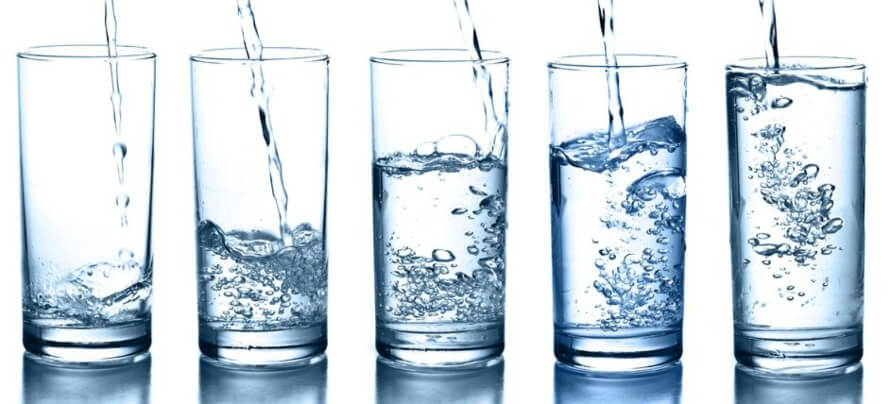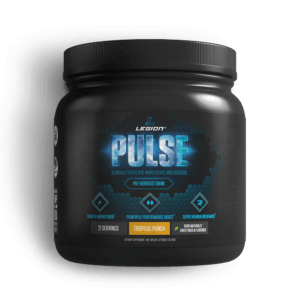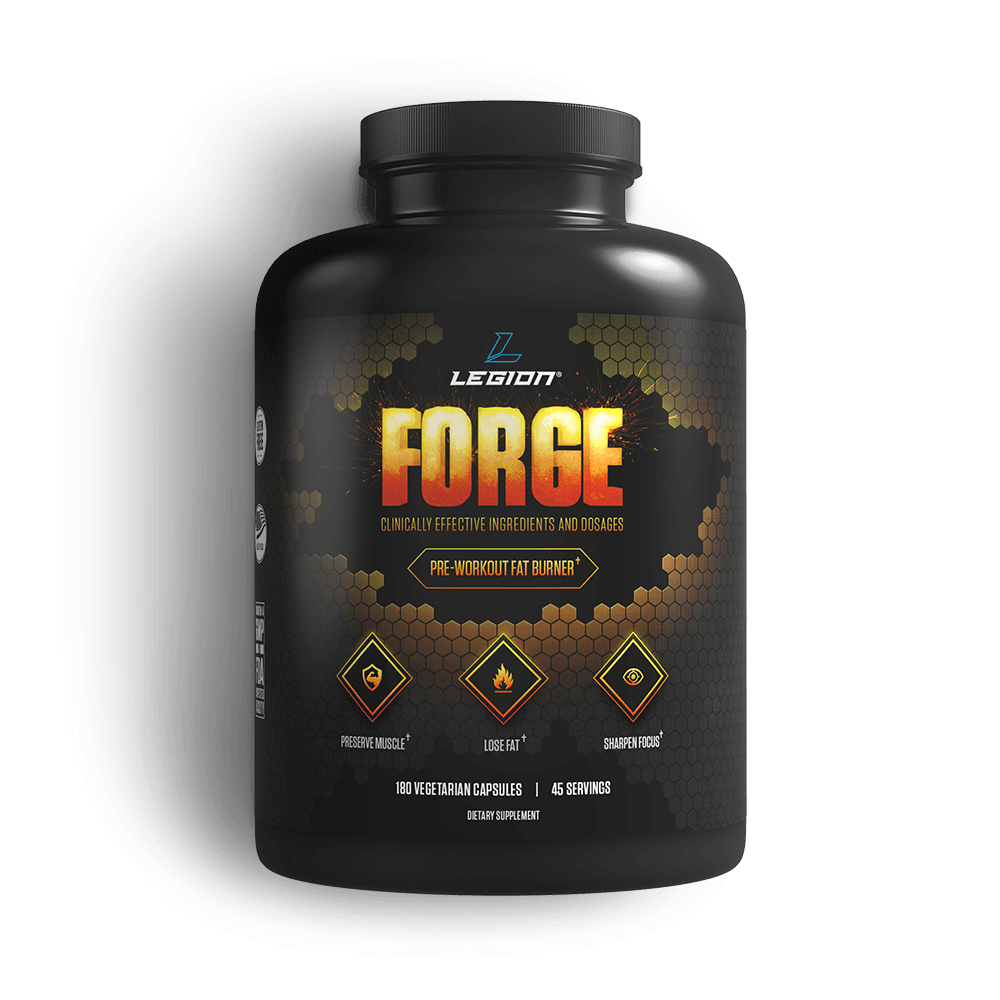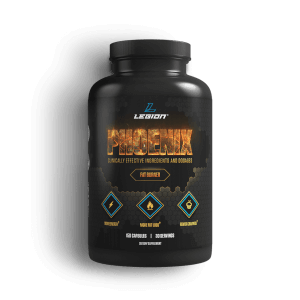Key Takeaways
- People use water fasting to lose weight quickly, “detox” their bodies, and slow aging and get healthier.
- Water fasting will help you lose weight and fat quickly, but most of the weight loss will be from water and you may lose muscle in the process.
- Water fasting doesn’t “detox” your body, slow aging, or offer any health benefits you can’t get from safer, more enjoyable forms of weight loss.
Fasting is becoming more and more popular.
You have intermittent fasting, alternate day fasting, 24-hour fasting, the 5:2 diet, and endless other variations.
And most of these methods don’t seem all that difficult or complex.
Instead of evenly spacing your meals throughout the day, you eat all of your calories in a shorter period of time (usually 4 to 10 hours) and you don’t eat the rest of the time.
According to some, though, there’s a better mousetrap out there—water fasting.
As you can guess, water fasting involves abstaining from all forms of food or drink except water, and you keep this up for anywhere from a day to several weeks.
You don’t have to look far to find stories of people who swear water fasting offers all kinds of benefits, including:
- Effortless weight loss
- More energy
- Improved complexion
- Slowed aging
- Better health
- And more . . .
Sounds good so far.
To many people, the most appealing part of water fasting is it’s so simple.
You never have to wonder what you can or can’t eat during the fast. You don’t have to make shakes or meal replacements or take supplements. You don’t have to plan your meals.
All you have to do is stop eating and drinking anything except water, and you’ll look sexier, feel better, be healthier in a few days, the water fasting proponents say.
Sure, you’ll be hungry some of the time, but it’s not that bad.
At least that’s what everyone on the Internet tells you.
You have your doubts, though, too.
It has the stamp of “too good to be true” written all over it, and if it doesn’t deliver on these promises, you’ll have suffered for no reason.
And yet . . . what if it only helped you lose a few pounds, or have slightly clearer skin, or gave you a little more energy, wouldn’t it be worth it?
In a word, no.
Water fasting will help you lose weight, but not because there’s something unique about only drinking water for a few days. Chances are also good that you won’t be happy with how you look at the end of your self-imposed starvation experiment.
It’s also not going to “detox” your body, improve your skin complexion, or do much of anything else for you except make you really, really hungry for a few days.
In this article, you’re going to learn why water fasting is an unhealthy way to lose weight and what you should do instead.
Let’s get started.
- What Is Water Fasting?
- How Is Water Fasting Different from Intermittent Fasting?
- Why Do People Try Water Fasting?
- Water Fasting Can Help You Lose Weight, But . . .
- Does Water Fasting “Detox” Your Body?
- Does Water Fasting Fight Aging?
- Is Water Fasting Dangerous?
- A Better Way to Lose Weight Fast
- 1. Use an aggressive (but not reckless) caloric deficit.
- 2. Eat a high-protein diet.
- 3. Do a lot of heavy compound weightlifting.
- 4. Strategically use cardio to burn fat faster.
- 5. Take fat loss supplements that actually work.
- The Bottom Line on Water Fasting
Table of Contents
Want to listen to more stuff like this? Check out my podcast!
What Is Water Fasting?
Water fasting involves refraining from eating or drinking anything except water for a period of time.
How long depends on who you ask.
Some only do it for a day, others for three to five days, and still others fast for a week or more.
Unlike intermittent fasting, where you typically abstain from food for 14 to 24 hours every day, water fasting entails one prolonged fast of several days or more.
It’s normally sold as a kind of “metabolic reset” that you’re supposed to do when you need to kick start fat burning, feel more energized, and make up for whatever other diet and lifestyle sins you’ve made over the past few months.
Summary: Water fasting involves not consuming any food or beverages aside from water for anywhere from a day to a week or more.


How Is Water Fasting Different from Intermittent Fasting?

As you learned a moment ago, intermittent fasting isn’t the same as water fasting.
Intermittent fasting generally involves not eating for a period of 14 to 24 hours. During this time, you’re generally allowed to eat flavored beverages like coffee, tea, or calorie-free energy drinks. Most people who practice intermittent fasting do this every day.
For example, a common intermittent fasting protocol looks like this:
6 AM: Wakeup
12 PM: Eat first meal
4 PM: Eat second meal
8PM Eat third meal
10 PM: Go to sleep
In this case, the person would be fasting for 16 hours and eating for 8 hours.
If you want to learn more about intermittent fasting, read this article:
The Definitive Guide to Intermittent Fasting
Water fasting involves not eating or drinking anything except water, and generally for multiple days at a time.
Obviously, people don’t (well, can’t) do this every day like they can intermittent fasting, because it involves consuming no calories whatsoever. You’re allowed electrolytes like salt, potassium, magnesium, and a multivitamin, but you aren’t allowed to consume anything that contains calories, including supplements like fish oil.
Most proponents of water fasting also eschew flavored or extremely low calorie beverages like coffee, diet Coke, and tea.
At bottom, water fasting is a short-term crash diet, whereas intermittent fasting is a long-term eating strategy for managing your calorie intake.
Summary: Intermittent fasting involves restricting your food intake to a particular time window during the day, generally around 8 to 10 hours, and doing this every day. Water fasting involves consuming nothing but water and some electrolytes or vitamins for several days at a time.
Why Do People Try Water Fasting?
The three main reasons people practice water fasting are as follows:
- To lose weight.
- To “detox” their bodies.
- To slow aging, avoid disease, and improve their health.
The first point is a no-brainer: if you don’t eat anything, you’re going to lose weight, but proponents of water fasting claim it offers unique fat burning effects.
Second, like many kinds of fasting, people say water fasting detoxes your body, improves cellular health, and even fights aging.
Finally, some people do it in the belief it will help them avoid disease, live longer, and feel better on a daily basis.
Let’s unpack each of these claims.
Water Fasting Can Help You Lose Weight, But . . .
Water fasting is often seen as a healthier form of crash dieting.
Now, if you know anything about how your metabolism works, you know that if you forgo any source of calories for a few days, you’re going to lose weight.
Advocates of water fasting say there’s more to the story, though.
They claim that if you want to lose fat as quickly and efficiently as possible, you need to put your body into a state of ketosis, and water fasting is one of the best ways to do this.
Are they right?
To learn the answer, you first need to understand and what ketosis is and how it works.
Ketosis is a metabolic process wherein your body gets energy from ketones instead of blood sugar (glucose).
Ketones or “ketone bodies” are energetic molecules produced by the liver that the body can make from fat.
When your body doesn’t have an ample supply of carbs, ketone production rises to meet your energy needs. As your body adapts to burning more ketones for fuel, you enter a state of ketosis.
Now, to enter ketosis, you just need to severely limit or eliminate your carb intake, and you can do this in one of two ways:
- Following a very low-carb diet (typically <30 grams of carbs per day).
- Fasting (which is basically a zero carb diet).
In both cases, your body has to burn fatty acids for fuel instead of glucose.
When most people enter ketosis through either of these methods, they experience rapid weight loss. We’re talking five or ten pounds in a matter of days in some cases.
This is why many people believe water fasting is a better way to lose weight than just restricting calories.
And they’re wrong.
You see, when you cut your carb intake, which is what happens when you go on a water fast, there’s a rapid drop in your whole-body glycogen stores. Glycogen is a form of glucose that’s stored in muscle and liver tissue, and when you stop eating carbs, glycogen levels plummet.
That will cause a small drop in body weight by itself, but here’s why you see such big swings:
Every gram of glycogen is stored with about 3 grams of water. The average man can store 15 grams of glycogen per kilogram of body weight, and regular exercise also increases the glycogen storage capacity of muscle.
When you do the math you can see how this could cause rapid, but fleeting, weight loss.
Here’s an example. I weigh 180 pounds (82 kilograms), lift weights regularly, and eat a high-carb diet (~2 grams per pound most days).
If I were to maximize my carb intake with a few days of refeeding, my body could store close to 1,200 grams of carbohydrate. For argument’s sake, though, let’s say it’s holding more like 800 grams of glycogen, which means I’m also carrying an additional 2,400 grams of water.
All told, that’s about 3.2 kilograms of extra body weight, or around 7 pounds.
If I were to slash my carbohydrate intake with a ketogenic diet or a water fast, I could lose that much in a few days.
If that weren’t enough, research also shows that carbohydrate intake can influence fluid retention in other ways. Ketones can have a diuretic effect, causing you to lose even more water weight than you’d expect from restricting your carb intake alone.
The bottom line is, the more carbs you eat, the more water you’re going to store, and the fewer carbs you eat, the faster you’ll lose weight.
What’s more, you won’t have any fiber or other food in your system when water fasting. If you’re eating a normal diet with plenty of fruits, vegetables, and grains, you’ll likely be carrying a few extra pounds of food in your stomach in the form of fiber, water, and other food matter throughout the day.
If you suddenly stop eating these foods during, as you do during a water fast, you can lose several more pounds of body weight.
All told, switching to a ketogenic diet or a water fast can make you lose over 10 pounds of body weight in a few days.
That is gratifying in the short-term, but it doesn’t mean this style of dieting is going to give you the body you want.
Here’s the rub with water fasting:
You will lose some fat, but most of the weight you lose during your fast is going to be water weight, and it will come right back when you start eating normally again.
As soon as you increase your calorie, and especially your carb intake, you’re going to gain weight just as fast as you lost it.
That’s disheartening in and of itself, but the bigger issue is what this does to your body composition over time.
Every time you embark on a multi-day water fast, chances are good you’ll lose some muscle.
It’s hard to say exactly how much, but the longer you fast, the more muscle you’re probably going to lose.
You can likely get away with water fasting for a day or so without losing any appreciable muscle, but once you push things past about the 24 hour mark, it’s all but guaranteed. After around 3 days, you’ll be losing about equal amounts of fat and lean mass (mostly muscle).
Lifting weights and eating protein can help you avoid this (what’s known as a “protein-sparing modified fast”), but at a certain point, you’re going to lose muscle if you keep your calories too low.
The problems don’t end there, though.
The most glaring problem while water fasting is hunger.
It’s easy to tell yourself that you’ll suck it up. You’ve been hungry before, so you can hack it for a few days.
That’s what everyone says, and that attitude usually comes back to bite them in the end.
How?
Nine times out of ten, forays into extreme calorie restriction end in a massive binge where you gain back all of the fat you lost and then some. At the very least, you’ll wipe out the progress you’ve made, leaving you more frustrated, defeated, and fat than ever.
This isn’t something Youtubers, fitness gurus, or social media “influencers” like to talk about, but it’s a hard reality of extreme calorie restriction.
When you cut your calories low enough for long enough, all you’re going to want to do at the end of that period is stuff your face with as many goodies as you can.
Researchers call this dietary “disinhibition,” and it’s a major risk factor for weight regain, eating disorders, and a preoccupation with food that can follow you for months or years.
In other words, starving yourself too hard to lose weight in the short term (typically to no avail), can make it harder to stick to future diets in the long run, which is what really moves the needle.
So, the bottom line is water fasting will help you lose a lot of weight, a little of it will be fat, most of it is going to be water, and much of it will be muscle.
And when it’s all said and done, chances are good you’ll have gained back the modicum of fat you lost.
Repeat this process over and over—starving yourself, losing some muscle and fat, and then going back to your normal eating habits—and over time you’ll develop that amorphous “skinny fat” look.
That’s not what you want.
While water fasting works for weight loss, it’s a dud when it comes to improving your body composition.
Summary: You can lose 5 or 10 pounds after several days of water fasting, but most of this weight loss is due to losing water and food mass, a small portion will be body fat, and some of it will be muscle. You’re also likely to regain whatever fat you lost during your water fast by overeating afterwards.
Does Water Fasting “Detox” Your Body?

To answer that question, we have to start at the beginning:
What are “toxins” and how does our body process them?
Well, toxins are poisonous substances you ingest or inhale. Plenty are manmade, but nature is rife with them, too
For example, caffeine and alcohol are toxins, the atmosphere contains toxins like ozone and nitrogen dioxide, and natural sources of water contain a whole host of dangerous contaminants like arsenic, fluoride, mercury, and cyanide.
The reality is modern living bombards your body with toxins every day, and if it didn’t have an effective way to dispose of them, you’d quickly take a dirt nap.
Fortunately, we have an arsenal of complex organic and chemical systems that eliminate harmful substances from our bodies and thus protect against disease and dysfunction.
The liver is the first line of defense because one of its primary jobs is transforming harmful chemicals in the body into harmless ones that can be excreted through urine, sweat, and feces. The kidneys help the body remove toxins and waste products as well.
Champions of water fasting claim it either helps these processes run smoother, or helps remove toxins from the body through other means.
The fact is, though, there’s absolutely zero evidence for any of these ideas, nor any plausible reason to think starving yourself for a few days would help remove toxins from your body.
If anything, reducing your nutrient intake could impair liver and kidney function thanks to a lack of B12 and other nutrients, which these organs need to function at full capacity.
Instead of water fasting, you can shore up your defenses against toxins by eating a healthy diet, exercising regularly, and limiting your consumption of proven toxins like cigarette smoke.
Summary: There’s no scientific evidence water fasting removes toxins from your body, helps your body naturally remove toxins, or “detoxes” your body in any way.
Does Water Fasting Fight Aging?
Some water fasting exponents claim it can delay or reverse aging, improve your skin tone, and increase your energy levels.
The “proof” for these claims is based on a little-known phenomenon called autophagy, a process where your body breaks down and recycles old parts of your cells that aren’t performing up to par.
In other words, when your body is scrambling for energy, it starts rooting through the “garbage” in your cells for scraps.
And according to many fitness gurus, this slows aging, wards off disease, and improves your health in just about every way you can think of.
What’s the science say about this, though?
Not much.
Despite the brouhaha about autophagy in some corners of the Internet, we don’t know how much fasting really influences this process in humans, or if it does, how much of an effect that would have on your health over the long term.
Here’s what we know:
Fasting promotes autophagy (at least in mice), and autophagy seems to be involved in the prevention of degenerative diseases.
That’s it.
Autophagy is going on all the time anyway—whether you’re water fasting or not—and right now, there isn’t a single study on people that shows water fasting is the best way to increase autophagy, or that this offers any health benefits.
When you compare water fasting to things that do have myriad proven health benefits, like exercise, sleep, and a healthy diet, it looks like even more of a flop.
Exercise also seems to stimulate autophagy, and sleep may play a role as well, so if you’re working out regularly and sleeping well, would fasting offer any additional benefits?
Nobody knows, but with so little evidence it’s patently false to say water fasting “slows aging” or offers any other health benefits.
Some water fasting evangelists also claim their methods slow or even reverse aging by reducing oxidative stress.
Oxidative stress is the process by which naturally produced volatile chemicals in the body known as reactive oxygen species (ROS) damage other cells.
These chemicals are produced whenever the body metabolizes oxygen or a substance containing oxygen.
Although ROS are generally considered unhealthy under all circumstances, this isn’t the case.
For example, although ROS are produced due to unhealthy behaviors like smoking, alcoholism, and sleep deprivation, they’re also produced due to healthy behaviors like exercise or eating food.
Water fasting proponents claim their methods help fight aging by reducing oxidative stress. While it’s true avoiding all food (both healthy and unhealthy) for a few days will reduce one source of oxidative stress, you can still experience oxidative stress from other sources.
All in all, it’s unlikely water fasting for a few days will affect oxidative stress levels enough to have any health benefits.
To understand why, you first need to understand that ROS and oxidative stress caused by ROS aren’t always bad for you.
In fact, research shows moderate doses of oxidative stress are good for you.
For example, a groundbreaking study conducted by scientists at the University of Vienna found the oxidative stress produced by extreme exercise can actually train the body to better defend itself against oxidative stress in the future.
In this case, Ironman triathletes were found to have no lingering signs of oxidative damage after a race, and the scientists believed this was “. . . due to training- and exercise-induced protective alterations in the antioxidant defense system.”
In other words, the athletes’ strenuous workout routines supercharged their body’s natural defense mechanisms against oxidative stress.
Other research shows ROS play a positive role in promoting muscle growth and immune function.
So, circling back to water fasting and oxidative stress, you can see that simply not eating for a few days is far from a surefire way to fight aging.
First, there’s robust scientific evidence exercise is an effective way to reduce the harmful effects of ROS, and scant evidence water fasting or food deprivation offers similar benefits.
Second, you encounter many other sources of oxidative stress on a daily basis that could easily wipe out whatever benefit you might get from not eating for a few days.
Third, even if water fasting reduces oxidative stress, it only does so for a few days, which is unlikely to improve your long-term health. What’s more, many people don’t have the energy to exercise when water fasting, which means they’re sacrificing a proven way to reduce oxidative stress (exercise) for a dubious one (water fasting).
Summary: There’s scant scientific evidence water fasting significantly increases autophagy, reduces oxidative stress, or slows aging in humans, and far more evidence exercise is a more effective (and enjoyable) way to accomplish all three of these goals at once.
Is Water Fasting Dangerous?
Some people say that just about any kind of fasting is dangerous, and if you go more than a few hours without eating, your metabolism slows your muscle starts to dissolve.
The other side of the aisle says that water fasting is completely safe and you have nothing to worry about.
Both of these groups are wrong.
Short fasts of a day or less probably don’t pose a serious risk to your health or muscle mass, but longer water fasts of several days or more can be dangerous.
The main things you need to pay attention to are:
- Dehydration
Most people get about 30% of their daily water intake from foods, so if you keep drinking the same amount of water during your fast as before, you could become dehydrated.
As long as you drink when you’re thirsty this shouldn’t be an issue, but it could cause problems if you aren’t paying attention.
- Hyponatremia
When some people embark on a water fast, they sometimes go to the other extreme and compensate for their lack of food intake by drinking absurd amounts of water.
While this seems harmless, it can dilute the level of sodium in your blood, causing a condition known as “hyponatremia.”
This can cause brain swelling and heart failure, and is one of the more common causes of preventable death among endurance athletes (who tend to pound fluids).
As long as you drink when you’re thirsty and stop when you aren’t, you probably won’t run into this issue, but it’s a possibility.
- Blood Sugar Swings
If you’re otherwise healthy, you shouldn’t experience major swings in blood sugar during a water fast.
If you’re diabetic or pre-diabetic, though, then going for long stretches without food can cause blood sugar to drop to dangerously low levels.
So, if you fall into those groups, don’t try it. Mkay?
A Better Way to Lose Weight Fast

Losing weight fast is easier than most think.
Eat as little food and do as much cardio as you can for the next month or two, and voila, the pounds fall off.
You may be disappointed in the end, though, even if you can suffer through it.
Why?
Well, for the reasons we discussed above. You might be pleased with the number on the scale, but the mirror will paint a different picture.
You may not look as fat as before, but you’re going to look more skinny fat, and that’s not the goal.
That’s why your goal shouldn’t be to “lose weight,” but to “lose fat and not muscle,” and that boils down to just five steps:
- Use an aggressive (but not reckless) calorie deficit.
- Eat a high-protein diet.
- Do a lot of heavy compound weightlifting.
- Use high-intensity interval training to burn fat faster.
- Take fat loss supplements that actually work.
Let’s go over each.
1. Use an aggressive (but not reckless) caloric deficit.
Studies show that the only way to lose a significant amount of fat is to eat fewer calories (less energy) than you burn.
You see, the reason you’re carrying excess body fat is, over time, you consistently ate more calories than you burned. And the only way to get rid of that excess fat is to do the opposite: eat less than you burn.
When you do this, you’re in a “caloric deficit” because, well, your energy intake is falling short of your body’s needs. It must get that energy from somewhere, though, and its go-to is body fat.
Now, the larger the caloric deficit, the faster the weight loss, but if you make it too large (by eating too little), you’re going to run into various problems related to “starvation dieting.”
You want to avoid that, but you also want to push the envelope as much as we can. That is, you want to be aggressive in your fat loss efforts, but not reckless. (And you can push things more than you many claim).
To put yourself in that sweet spot, set your calorie deficit at 20 to 25% (eat 20 to 25% fewer calories than you burn every day).
Research shows that this will allow you to lose fat rapidly without losing muscle.
(And if you’d like even more specific advice about how many calories, how much of each macronutrient, and which foods you should eat to reach your health and fitness goals, take the Legion Diet Quiz.)
If you follow the rest of the steps in this article, you also shouldn’t run into much in the way of hunger or cravings, either.
Sure, you might feel twinges now and then, but nothing like what you’d experience with water fasting.
Want to learn more about how to calculate how many calories you should eat? Check out this article.
2. Eat a high-protein diet.
When we’re talking body composition, protein is the most important macronutrient by a long shot.
Studies show that eating adequate protein helps you…
- Recover faster from your workouts.
- Gain muscle and lose fat faster.
- Retain muscle better while restricting your calories for weight loss.
- Feel more satiated by your meals (and thus be less likely to overeat).
The bottom line is high-protein dieting beats low-protein in every way, really, and especially when you’re cutting.
So, what’s the right amount of protein then?
Well, when you’re looking to lose fat, then you should eat about 1 gram of protein per pound of body weight per day.
And if you’re very overweight (25%+ body fat in men and 30%+ in women), then this can be reduced to around 1 gram of protein per pound of lean body mass per day, or 40% of your total calorie intake (whichever number is lower).
Want to know more about how much protein you should eat? Check out this article.
3. Do a lot of heavy compound weightlifting.
When the goal is maintaining (or gaining) muscle mass while losing fat, nothing beats heavy compound weightlifting.
It’s better than workout machines, “pump” classes, bodyweight exercises, Yoga, Pilates, and everything else you can do to develop your muscles.
What do I mean by “heavy compound” lifting, though?
Well, by “compound,” I mean focusing on compound exercises, which are those that target multiple large muscle groups, such as the squat, bench press, military press, and deadlift.
And by “heavy,” I mean lifting weights that are above 75% of your one-rep max (weights that you can do 12 reps or less with before failing).
The main reason heavy compound weightlifting is so effective is it’s the best way to overload your muscles, which is the primary trigger for muscle growth.
By lifting heavy weights (and progressing to heavier and heavier weights as you get stronger), you create tremendous amounts of tension in your muscles, and this tells them to grow.
I think you can figure out how this benefits you when you’re restricting your calories for fat loss.
In short, it allows you to minimize muscle loss while dieting, or, depending on your circumstances, even gain muscle while you’re losing fat.
Want to know how to build an effective weightlifting routine? Check out this article.
4. Strategically use cardio to burn fat faster.
The best way to include cardio in a weight loss regimen is to do as little as needed to reach your desired rate of weight loss and stay fit, and no more.
For best results do . . .
- At least two low- to moderate-intensity cardio workouts per week of 20-to-40 minutes each.
- One HIIT workout per week if you enjoy it.
- No more than 2-to-3 hours of cardio per week.
- Cardio and weightlifting on separate days. If that isn’t possible, lift weights first and try to separate the two workouts by at least 6 hours.
Although you’ll often hear fitness gurus tout HIIT as the most effective kind of cardio for fat loss, this isn’t true. Moderate-intensity, steady-state cardio is just as good at fat-burning, easier to recover from, and doesn’t sap your motivation or energy as much as HIIT, which is why I recommend you do it for the majority of your cardio workouts.
5. Take fat loss supplements that actually work.
I saved this for last because it’s the least important.
Unfortunately, no amount of weight loss pills and powders are going to give you the body you want.
In fact, most fat loss supplements are completely worthless.
But, here’s the good news:
If you know how to drive fat loss with proper eating and exercise, like we’ve just covered, then certain supplements can help speed up the process. (And if you’d like to know exactly what supplements to take to reach your fitness goals, take the Legion Supplement Finder Quiz.)
And here are those supplements:
3 to 6 milligrams of caffeine per kilogram of body weight per day.
Caffeine raises the number of calories you burn and also increases strength, muscle endurance, and anaerobic performance. There’s some evidence caffeine may also help you eat less, too.
You can get your caffeine from any source, but if you’re looking for a convenient option that includes several other ingredients proven to boost workout performance, then you want to try PULSE.

0.1 to 0.2 milligrams of yohimbine per kilogram of bodyweight before fasted exercise.
If you like to train fasted, there’s evidence that yohimbine can help increase fat burning during your workouts.
The problem with fasted training is that it can also accelerate muscle loss and take some of the “oomph” out of your workouts, which is why it’s helpful to take something that helps you maintain focus and reduce muscle breakdown before your workouts.
And that’s where FORGE enters the picture. Along with a clinically effective dose of yohimbine, it contains two other ingredients proven to decrease muscle breakdown and help you maintain the intensity of your workouts.
So, if you want to get leaner faster, and especially in the “hard to lose” spots like the hips, thighs, and belly, then you want to try FORGE today.

1 to 2 servings of PHOENIX per day.
Do you want to lose fat faster without giving up coffee and pre-workout?
And without upset stomachs, jitters, nausea, or the dreaded post-workout crash?
Well, PHOENIX is a 100% natural and caffeine-free fat burner that helps you lose fat faster in three ways:
- It increases your metabolic rate.
- It amplifies the power of fat-burning chemicals produced by your body.
- It increases the feeling of fullness from food.
In short, it speeds up your metabolism, helps your body burn fat more efficiency, and helps you control hunger and cravings and maintain high energy levels.
It also contains no artificial food dyes, fillers, or other unnecessary junk.
So, if you want to burn more fat every day and have an easier time sticking to your diet without having to pump yourself full of harsh stimulants or potentially harmful chemicals, then you want to try PHOENIX today.

Again, if you feel confused about what supplements you should take to reach your goals, take the Legion Supplement Finder Quiz to learn exactly what supplements are right for you. It’s the best way to ensure you get the most out of your supplement regimen.
The Bottom Line on Water Fasting
Water fasting is, at bottom, a dressed up version of crash dieting.
It will help you lose weight quickly, but most of what you lose will be water weight, some will be fat, and a lot will be muscle.
Water fasting doesn’t “detox” your body, slow aging, or help you avoid disease, and it poses a few health risks that the proponents like to downplay.
The good news, though, is that you absolutely can lose weight quickly, safely, and healthily. All you have to do is follow the advice in this article:
- Use an aggressive (but not reckless) caloric deficit.
- Eat a high-protein diet.
- Do a lot of heavy compound weightlifting.
- Strategically use cardio to burn fat faster.
- Take fat loss supplements that actually work.
Stick to that plan, and you’ll be much happier with how you look and feel than if you were to try water fasting.
Oh, and if reading this article has got you thinking water fasting isn’t right for your circumstances and goals, then take the Legion Diet Quiz! In less than a minute, you’ll know exactly what diet is right for you. Click here to check it out.
What’s your take on water fasting? Have anything else to share? Let me know in the comments below!
+ Scientific References
- Ostojic SM. Yohimbine: The effects on body composition and exercise performance in soccer players. Res Sport Med. 2006;14(4):289-299. doi:10.1080/15438620600987106
- Schubert MM, Irwin C, Seay RF, Clarke HE, Allegro D, Desbrow B. Caffeine, coffee, and appetite control: a review. Int J Food Sci Nutr. 2017;68(8):901-912. doi:10.1080/09637486.2017.1320537
- Beck TW, Housh TJ, Schmidt RJ, et al. The acute effects of a caffeine-containing supplement on strength, muscular endurance, and anaerobic capabilities. J Strength Cond Res. 2006;20(3):506-510. doi:10.1519/18285.1
- Astorino TA, Rohmann RL, Firth K. Effect of caffeine ingestion on one-repetition maximum muscular strength. Eur J Appl Physiol. 2008;102(2):127-132. doi:10.1007/s00421-007-0557-x
- Astrup A, Toubro S, Cannon S, Hein P, Breum L, Madsen J. Caffeine: A double-blind, placebo-controlled study of its thermogenic, metabolic, and cardiovascular effects in healthy volunteers. Am J Clin Nutr. 1990;51(5):759-767. doi:10.1093/ajcn/51.5.759
- Gergley JC. Comparison of two lower-body modes of endurance training on lower-body strength development while concurrently training. J Strength Cond Res. 2009;23(3):979-987. doi:10.1519/JSC.0b013e3181a0629d
- MacPherson REK, Hazell TJ, Olver TD, Paterson DH, Lemon PWR. Run sprint interval training improves aerobic performance but not maximal cardiac output. Med Sci Sports Exerc. 2011;43(1):115-122. doi:10.1249/MSS.0b013e3181e5eacd
- Boutcher SH. 1. HIIT and FAT LOSS. J Obes. 2011;2011:868305. doi:10.1155/2011/868305
- Schoenfeld BJ. The mechanisms of muscle hypertrophy and their application to resistance training. J Strength Cond Res. 2010;24(10):2857-2872. doi:10.1519/JSC.0b013e3181e840f3
- Halton TL, Hu FB. The effects of high protein diets on thermogenesis, satiety and weight loss: A critical review. J Am Coll Nutr. 2004;23(5):373-385. doi:10.1080/07315724.2004.10719381
- Helms ER, Aragon AA, Fitschen PJ. Evidence-based recommendations for natural bodybuilding contest preparation: Nutrition and supplementation. J Int Soc Sports Nutr. 2014;11(1):1-20. doi:10.1186/1550-2783-11-20
- Evans EM, Mojtahedi MC, Thorpe MP, Valentine RJ, Kris-Etherton PM, Layman DK. Effects of protein intake and gender on body composition changes: A randomized clinical weight loss trial. Nutr Metab. 2012;9(1):55. doi:10.1186/1743-7075-9-55
- Tipton KD, Ferrando AA. Improving muscle mass: Response of muscle metabolism to exercise, nutrition and anabolic agents. Essays Biochem. 2008;44:85-98. doi:10.1042/BSE0440085
- Phillips SM, van Loon LJC. Dietary protein for athletes: From requirements to optimum adaptation. J Sports Sci. 2011;29(SUPPL. 1). doi:10.1080/02640414.2011.619204
- Huovinen HT, Hulmi JJ, Isolehto J, et al. Body composition and power performance improved after weight reduction in male athletes without hampering hormonal balance. J Strength Cond Res. 2015;29(1):29-36. doi:10.1519/JSC.0000000000000619
- Hand GA, Shook RP, Paluch AE, et al. The energy balance study: The design and baseline results for a longitudinal study of energy balance. Res Q Exerc Sport. 2013;84(3):275-286. doi:10.1080/02701367.2013.816224
- Mohsin F, Zabeen B, Raza S, et al. Fasting guidelines for diabetic children and adolescents. Indian J Endocrinol Metab. 2012;16(4):516. doi:10.4103/2230-8210.97998
- Jaleel M, Fathima F, Raza S, Jaleel BN. Ramadan and diabetes: As-Saum (The fasting). Indian J Endocrinol Metab. 2011;15(4):268. doi:10.4103/2230-8210.85578
- Hew-Butler T, Loi V, Pani A, Rosner MH. Exercise-Associated hyponatremia: 2017 update. Front Med. 2017;4(MAR). doi:10.3389/fmed.2017.00021
- Oren RM. Hyponatremia in congestive heart failure. Am J Cardiol. 2005;95(9 SUPPL. 1):2-7. doi:10.1016/j.amjcard.2005.03.002
- Nathan BR. Cerebral correlates of hyponatremia. Neurocrit Care. 2007;6(1):72-78. doi:10.1385/NCC:6:1:72
- Saker P, Farrell MJ, Egan GF, McKinley MJ, Denton DA. Overdrinking, swallowing inhibition, and regional brain responses prior to swallowing. Proc Natl Acad Sci U S A. 2016;113(43):12274-12279. doi:10.1073/pnas.1613929113
- Guelinckx I, Tavoularis G, König J, Morin C, Gharbi H, Gandy J. Contribution of water from food and fluids to total water intake: Analysis of a French and UK population surveys. Nutrients. 2016;8(10). doi:10.3390/nu8100630
- Yang Y, Bazhin A V., Werner J, Karakhanova S. Reactive oxygen species in the immune system. Int Rev Immunol. 2013;32(3):249-270. doi:10.3109/08830185.2012.755176
- Neubauer O, König D, Kern N, Nics L, Wagner KH. No indications of persistent oxidative stress in response to an ironman triathlon. Med Sci Sports Exerc. 2008;40(12):2119-2128. doi:10.1249/MSS.0b013e3181824dab
- Lindsay DG. Diet and ageing: the possible relation to reactive oxygen species. J Nutr Health Aging. 1999;3(2):84-91. http://www.ncbi.nlm.nih.gov/pubmed/10885803. Accessed March 4, 2020.
- He F, Li J, Liu Z, Chuang CC, Yang W, Zuo L. Redox mechanism of reactive oxygen species in exercise. Front Physiol. 2016;7(NOV). doi:10.3389/fphys.2016.00486
- Jówko E, Różański P, Tomczak A. Effects of a 36-h survival training with sleep deprivation on oxidative stress and muscle damage biomarkers in young healthy men. Int J Environ Res Public Health. 2018;15(10). doi:10.3390/ijerph15102066
- Wu D, Zhai Q, Shi X. Alcohol-induced oxidative stress and cell responses. In: Journal of Gastroenterology and Hepatology (Australia). Vol 21. Blackwell Publishing; 2006:S26-9. doi:10.1111/j.1440-1746.2006.04589.x
- Valavanidis A, Vlachogianni T, Fiotakis K. Tobacco smoke: Involvement of reactive oxygen species and stable free radicals in mechanisms of oxidative damage, carcinogenesis and synergistic effects with other respirable particles. Int J Environ Res Public Health. 2009;6(2):445-462. doi:10.3390/ijerph6020445
- Mana R. Ehlers, Rebecca M. Todd. Oxidative Stress: Harms and Benefits for Human Health. Neural Plast. 2017;1(1):2-3. doi:10.1155/2017
- He Y, Cornelissen-Guillaume GG, He J, Kastin AJ, Harrison LM, Pan W. Circadian rhythm of autophagy proteins in hippocampus is blunted by sleep fragmentation. Chronobiol Int. 2016;33(5):553-560. doi:10.3109/07420528.2015.1137581
- He C, Sumpter R, Levine B. Exercise induces autophagy in peripheral tissues and in the brain. Autophagy. 2012;8(10):1548-1551. doi:10.4161/auto.21327
- Boeing H, Bechthold A, Bub A, et al. Critical review: Vegetables and fruit in the prevention of chronic diseases. Eur J Nutr. 2012;51(6):637-663. doi:10.1007/s00394-012-0380-y
- Irwin MR. Sleep and inflammation in resilient aging. Interface Focus. 2014;4(5). doi:10.1098/rsfs.2014.0009
- Booth FW, Roberts CK, Laye MJ. Lack of exercise is a major cause of chronic diseases. Compr Physiol. 2012;2(2):1143-1211. doi:10.1002/cphy.c110025
- Levine B, Kroemer G. Autophagy in the Pathogenesis of Disease. Cell. 2008;132(1):27-42. doi:10.1016/j.cell.2007.12.018
- Alirezaei M, Kemball CC, Flynn CT, Wood MR, Whitton JL, Kiosses WB. Short-term fasting induces profound neuronal autophagy. Autophagy. 2010;6(6):702-710. doi:10.4161/auto.6.6.12376
- Mizushima N. Autophagy: Process and function. Genes Dev. 2007;21(22):2861-2873. doi:10.1101/gad.1599207
- STEVENSON TD, BEARD MF. Serum vitamin B12 content in liver disease. N Engl J Med. 1959;260(5):206-210. doi:10.1056/NEJM195901292600503
- Cuntz U, Leibbrand R, Ehrig C, Shaw R, Fichter MM. Predictors of post-treatment weight reduction after in-patient behavioral therapy. Int J Obes. 2001;25:S99-S101. doi:10.1038/sj.ijo.0801710
- Stice E, Davis K, Miller NP, Marti CN. Fasting Increases Risk for Onset of Binge Eating and Bulimic Pathology: A 5-Year Prospective Study. J Abnorm Psychol. 2008;117(4):941-946. doi:10.1037/a0013644
- Sawamoto R, Nozaki T, Nishihara T, et al. Predictors of successful long-term weight loss maintenance: A two-year follow-up. Biopsychosoc Med. 2017;11(1):14. doi:10.1186/s13030-017-0099-3
- Dulloo AG, Jacquet J, Girardier L. Poststarvation hyperphagia and body fat overshooting in humans: a role for feedback signals from lean and fat tissues. Am J Clin Nutr. 1997;65(3):717-723. doi:10.1093/ajcn/65.3.717
- Protein, fat, and carbohydrate requirements during starvation: anaplerosis and cataplerosis | The American Journal of Clinical Nutrition | Oxford Academic. https://academic.oup.com/ajcn/article/68/1/12/4666020. Accessed March 4, 2020.
- Glycogen storage: illusions of easy weight loss, excessive weight regain, and distortions in estimates of body composition | The American Journal of Clinical Nutrition | Oxford Academic. https://academic.oup.com/ajcn/article/56/1/292S/4715743. Accessed March 4, 2020.
- Denke MA. Metabolic effects of high-protein, low-carbohydrate diets. Am J Cardiol. 2001;88(1):59-61. doi:10.1016/s0002-9149(01)01586-7
- Osterberg KL, Pallardy SE, Johnson RJ, Horswill CA. Carbohydrate exerts a mild influence on fluid retention following exercise-induced dehydration. J Appl Physiol. 2010;108(2):245-250. doi:10.1152/japplphysiol.91275.2008
- Jensen J, Rustad PI, Kolnes AJ, Lai YC. The role of skeletal muscle glycogen breakdown for regulation of insulin sensitivity by exercise. Front Physiol. 2011;2 DEC. doi:10.3389/fphys.2011.00112
- Acheson KJ, Schutz Y, Bessard T, Anantharaman K, Flatt JP, Jequier E. Glycoprotein storage capacity and de novo lipogenesis during massive carbohydrate overfeeding in man. Am J Clin Nutr. 1988;48(2):240-247. doi:10.1093/ajcn/48.2.240
- Kreitzman SN, Coxon AY, Szaz KF. Glycogen storage: illusions of easy weight loss, excessive weight regain, and distortions in estimates of body composition. Am J Clin Nutr. 1992;56(1 Suppl):292S-293S. doi:10.1093/ajcn/56.1.292S
- Costill DL, Fink WJ, Hargreaves M, King DS, Thomas R, Fielding R. Metabolic characteristics of skeletal muscle during detraining from competitive swimming. Med Sci Sports Exerc. 1985;17(3):339-343. doi:10.1249/00005768-198506000-00007









